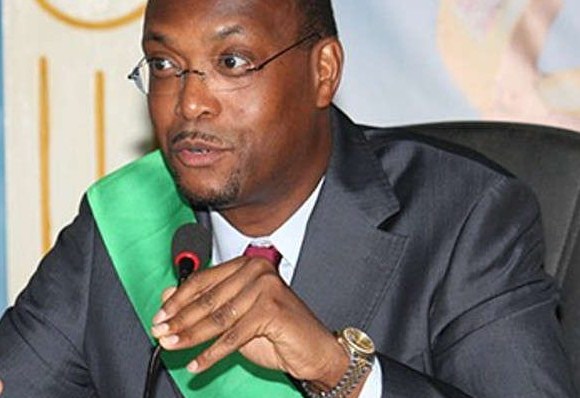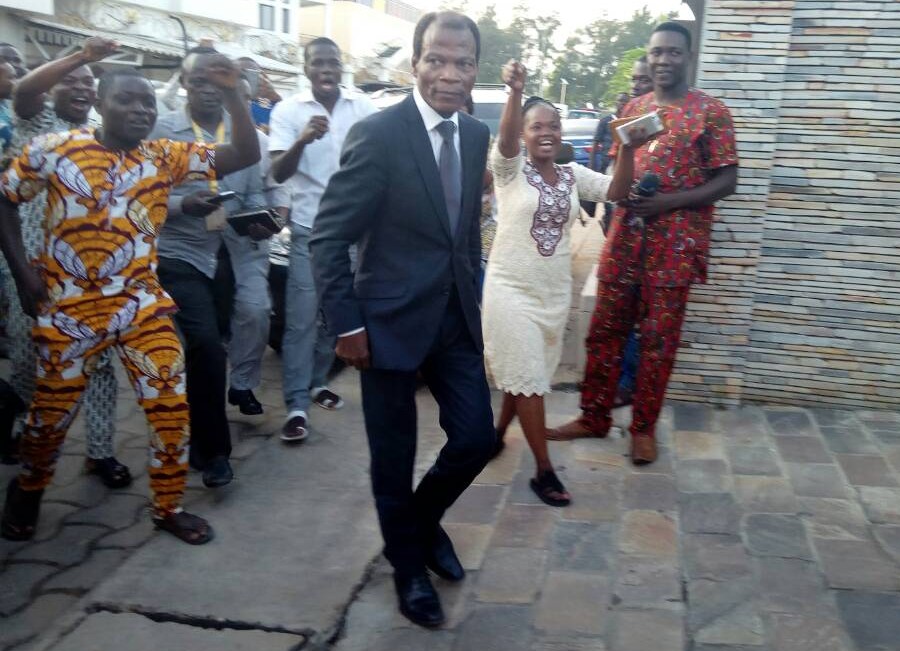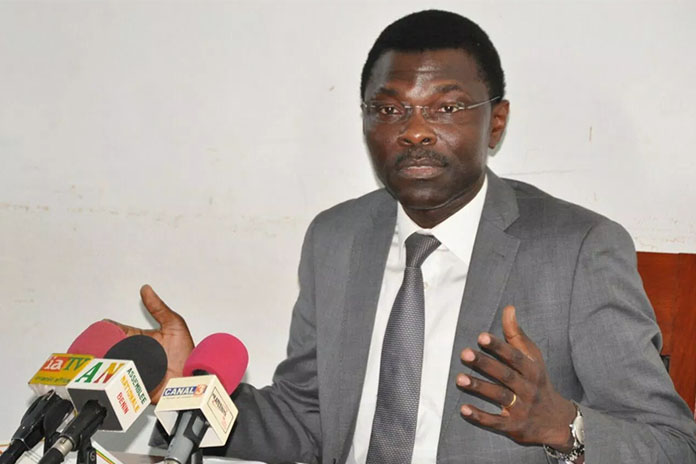Cotonou mayor’s suspension for “grave faults” causes stir

BY SOUMANOU SALIFOU
The two-month suspension of Cotonou mayor Lehady Soglo due to “grave faults” moments after he was audited on Friday by his superior, the “prefet” of the Littoral administrative region, caused quite a stir in Benin’s largest city. While no acts of violence were reported, the search, Friday evening, of the mayor’s residence by the police while an impressive number of police officers engaged in a non-violent confrontation with a large crowd outside, was quite an event quickly used by political agitators to cry foul, denouncing what they view as dictatorial tendencies under President Talon.
“They are after me, not Lehady,” said Soglo’s mother, Rosine Vieyra Soglo, the most senior lawmaker in Benin, in a report aired by TV5 Monde Saturday evening. The former first lady who rushed to her son’s residence with her husband, former president Nicephore Soglo, added that her son was being punished for her voting against President Talon’s plan to change the Constitution. Images of two political giants, the recently-removed mayor of the historical city of Ouidah, Severin Adjovi, and that of President Talon’s one-time friend and cabinet minister, Candide Azannai, who abruptly resigned two months ago, flew all over the social media.

Lehady Soglo was given prior notice of his audition, with his superior asking him to address several violations of his office, including the following: His representation allowance jumping from 2,000,000 francs annually to 10,000,000 francs in 2017. The engagement of a number of expenditures without following proper procedures. The miss-use of public funds in various ways, including for car rental instead of using office vehicles. Not the least was the destruction of accounting data uncovered during one of several audits of his office. Lehady was also grilled over his reluctance to obey a decision by the prefet‘s office annulling the illegal appointment of a senior executive at his office. That is not to mention his flatly ignoring his superior’s denial of his request to travel to Geneva to attend the co-celebration of Benin’s Independence Day by Benin and Switzerland on 1 August. The mayor was reportedly all set to fly to Geneva on Friday.
Moments after the completion of the audition, news of Soglo’s suspension by the minister in charge of decentralization [under whose authority fall all the mayor’s offices in the country] was all over town. Then followed the police search of Soglo’s residence, reportedly in his absence. Some cried foul, denouncing what they viewed as President Talon’s repressive machine in action to put the mayor behind bars.

Not so, said Justice Minister Joseph Djogbnou in a press conference during the ordeal. “No authority in the entire judiciary or governmental chain has given an order to arrest anyone,” said the minister. Djogbenou made it clear his remarks had nothing to do with the “administrative process that had led to the suspension of Mayor Lehady Soglo,” saying: “I will not comment on that until the minister of decentralization has reported to the government on that matter.” He then listed the reasons—mentioned above in part—for Soglo’s suspension.
Many authoritative voices, including that of Clement Dona Gnonlonfoun, a former mayor, and Claude Djankaki, a retired civil servant and political activist who has authored a two-volume book on decentralization, declared on the social media that though Mayor Lehady Soglo’s suspension might be legally justified, the process was rushed, giving the impression of Soglo being harassed.
Gnonlonfoun, who totalled seven years of service as mayor of one of the main cities in Benin and says he is very familiar with the decentralization law, wrote on the social media about “the grave presumptions against Lehady Soglo,” and feared the now-suspended mayor might not be able to get out of trouble. Gnonlonfoun, however, denounced what he termed
“the rush with which the process unfolded in fewer than 12 hours without giving Lehady time to reply in writing, and sending security forces to search his residence without due warrant.”
Gnonlonfou feels the matter should have been referred to the justice department, and Lehady would bear the consequences if found guilty.
Gnonlonfoun concluded alarmingly:
“Let’s be mindful that if we condone this nonsense of the violation of the right of the presumed guilty that is now being used against Lehady, we would simply allow Talon and his regime to be a monstrous machine of the worst type of dictatorship that will crush everything on its way.”
“Nobody would know who is next,” Gnonlonfoun feared.
The minister of Justice, Joseph Djogbenou, could not disagree more. Pointing to Lehady’s plans to fly to Geneva Friday despite not being allowed by his superior to do so, the minister said during the press conference mentioned earlier:
“This is about a police inquiry that has led the police to search the mayor’s residence. Everything happened in accordance with the current criminal code.”
Djogbenou actually raised a concern about obstruction of justice by the suspended mayor:
“Obstructions of free inquiry were observed in this case, and when [the police arrived], the person concerned, that is Lehady Soglo, could not be found at his residence.”
Djogbenou emphasized the determination of President Talon’s government to fight impunity in all its forms. He reminded the press about a similar inquiry at the office of the mayor of Porto-Novo.
“The mayor of Porto-Novo was questioned last week. We saw no father or mother come to his defense.” The minister then asked, rhetorically:
“We should wonder, when people are found guilty of proven facts, shouldn’t they answer to the authority.”
Benin’s democracy proved its vibrancy once again, as the mayor’s suspension was the talk of the town all over the weekend, even in a regularly-scheduled Sunday morning talkshow on the government-owned radio. Guests with proven expertise on the subject freely discussed the matter, with listeners calling in to express their views.


